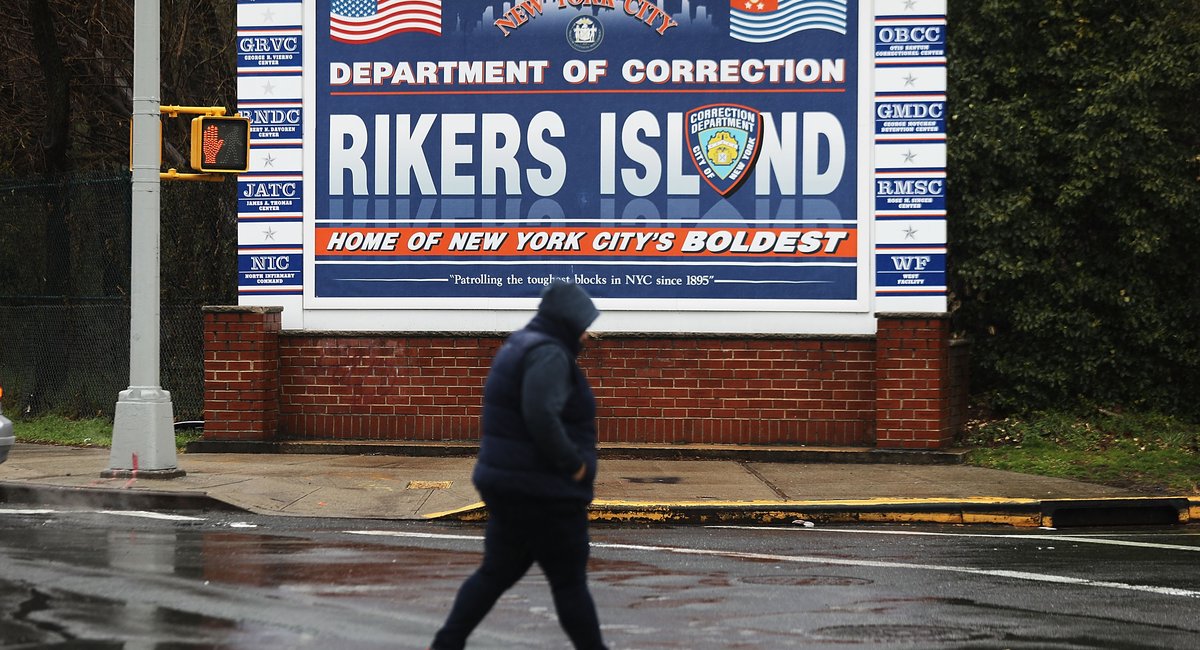A group of about 10 men held at Rikers Island on civil charges like failing to pay child support were locked in isolated cells for 23 hours a day for nearly a month in November, according to lawyers and documents obtained by Gothamist.
It’s unclear why the men were held in these conditions, which are usually reserved for people who have assaulted others while in jail. Spokesperson Frank Dwyer said the units the men were held in are typically used to secure detainees at risk of harm in general population — also known as protective custody. He said cells have “day rooms” attached with TVs and phones that detainees can access during out-of-cell-time.
However, lawyers and advocates say the isolated units still amount to solitary confinement – a practice that city officials maintain they have not used in several years, and that the City Council is set to outlaw as early as this week. Jail staff who have worked in the unit and attorneys who have filed lawsuits on behalf of people detained said the cells are small, dark and isolated. While the attached cages may have phones and televisions, those amenities are only accessible when cells are unlocked, according to lawyers and documents.
The City Council is expected to approve a bill on Wednesday that would outlaw solitary confinement as a matter of human rights for everyone – even violent offenders. The push comes as lawyers and federal officials seek to wrest control of Rikers Island from the city due to persistent violence and deaths in the jails.
Alexander Reinert, a law professor at the Cardozo School of Law, said the conditions the men were held in are unacceptable under any circumstances, and “certainly improper for people held civilly.”
Reinert was one lawyer representing plaintiffs detained in the unit where the men were held – called the North Infirmary Command – from 2018 to 2022. His clients won a $53 million settlement with the city after they claimed in legal papers that they were illegally held in solitary confinement cells 23 hours a day, deprived of recreation and natural light.
Reinert said locking people accused of civil violations up for 23 hours per day ahead of a vote on a solitary confinement bill showed jails officials were out of touch.
“For this to be happening at the same time the City Council is taking up legislation to ban solitary confinement within New York City jails is just an indication of how far removed the Department of Correction is from what is appropriate treatment of people being held in their facilities,” Reinert said.
A number of the detainees held in the isolation units called the Legal Aid Society Prisoners’ Rights Project multiple times through November to report being held under “very restrictive conditions,” said attorney Veronica Vela. They said a total of 10 detainees facing civil claims, including failure to pay child support, were locked in cells 23 hours a day on the second floor of the North Infirmary Command building, with restrained movement and only one hour of recreation per day, she said.
The units were designed as a “humane alternative” to solitary confinement, the city said at the time. But lawmakers who made an unannounced visit to the North Infirmary Command in 2021 slammed the cells as being “solitary by another name,” the Queens Daily Eagle reported at the time. Photos showed mesh metal cages connected to traditional jail cells, lining a narrow hallway. TVs and phones are in the cages, and are accessible during “out-of-cell time” when the bars between cells and cages are unlocked.
The United Nations defines solitary confinement as “the confinement of prisoners for 22 hours or more a day without meaningful human contact” and says solitary confinement of more than 15 consecutive days is regarded as a form of torture.
Vela reported the complaints to the Board of Correction and Department of Correction in mid-November and followed up a week later. The board investigated the practice, and the men moved out of the North Infirmary Command to a general population jail on Rikers Island on Dec. 1.
Dwyer said, in addition to day rooms with phones and televisions, detainees “have the ability to communicate with each other from their separate cells,” are required to receive an hour of recreation, and have opportunities to attend programs and medical appointments, with law library access.
“[The department] does not use solitary confinement and has not used that practice for several years,” Dwyer said.
John Proctor, founding facilitator at Re/Creation, a nonprofit delivering writing workshops to incarcerated people, said celebrities, politicians and city officers charged with crimes are sometimes held in the units under protective custody in much less restrictive conditions. But, he added, the department also uses it for “punitive segregation” – housing people who have assaulted others or have been assaulted in jail.
The men reported being in the North Infirmary Command Unit 2A, which staff said they knew as one of the units used to isolate violent offenders. Proctor said he delivered writing workshops at the unit from 2019 to 2022. He said 2A was “by far” the worst environment he encountered at Rikers. Although the cells adjoin each other, men would have to yell to be heard from one cell to the next.
While the department no longer uses the term “solitary confinement,” advocates, lawyers, elected officials, detainees and board members say it is still being used on Rikers in places like the North Infirmary Command units – albeit by different names.
“Punitive segregation, enhanced restraint, it’s all bureaucratic euphemisms that are talking about essentially the same thing: solitary confinement,” Proctor said.
Reacting to the reports of men facing child support charges being held in the units, Cuti Hecker Wang attorney Eric Hecker, who also represented the plaintiffs in the previous solitary confinement settlement against the city, said putting people in “cramped dehumanizing cages” for at least 23 hours each day is cruel under any circumstances, especially if the person has not been deemed a serious security risk.
“We are continuing to investigate what appears to be the city’s ongoing use of these [North Infirmary Command] cages for unlawful restrictive confinement,” he said.
Under state law, experts say people who fail to pay child support can be held in jail for up to six months. But it only happens in extreme cases.
Cohen Forman Barone partner Carla A. Barone said a judge can hold a parent in contempt of court only after looking at all the evidence and having a hearing to determine that they “willfully” didn’t pay. It’s not enough that they are simply unable to pay. “Incarceration is usually a last resort,” Barone said.
In 2021, state lawmakers passed a law that requires seven hours of daily out-of-cell time and limits the use of solitary confinement to 15 consecutive days.
Six years earlier, the practice was banned for all inmates 21 and younger in New York City amid the death of Kalief Browder, who spent his late teenage years on Rikers Island – and more than 800 days in solitary confinement – for a petty robbery charge that was ultimately dismissed. He died by suicide in 2015.
Wednesday’s solitary confinement bill would require detainees who are held in restrictive housing like the North Infirmary Command units to have at least 14 hours outside of cells each day.



Leave a Reply